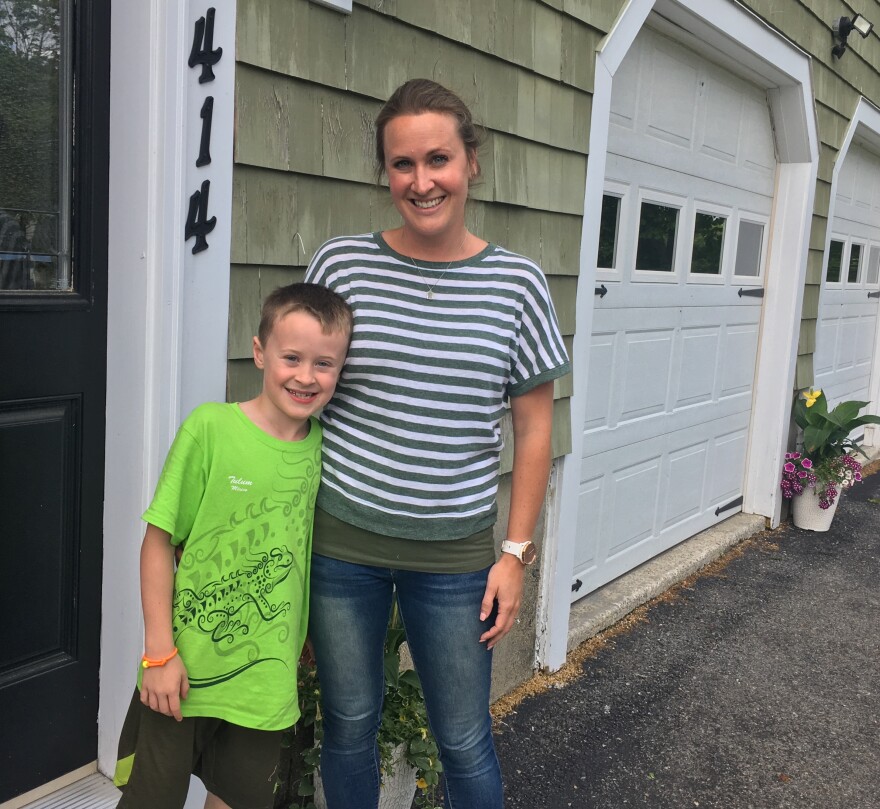Deanna Anthony remembers the moment she realized there was something wrong with her water.
It was June 2018, and she and her husband Dave had just moved into a house on Main Street in Hampstead, down the road from where Dave grew up. It had a pool, a big yard where their 7-year-old son could play, and a newly drilled well.
“About two weeks after we moved in, all of a sudden the water started coming out thick and orange and staining. It was just really sudden and I’m like - what happened?” she remembers.
A few weeks later, the water stopped running entirely. It didn’t come back for six months.
In the year since, the Anthony’s well has helped spur a battle over Hampstead’s water and the privately-owned water utility that operates in town, Hampstead Area Water Company. As the company profits from pumping more water from local aquifers, many residents’ wells are going bad and running dry.
"We can't move. We can't sell the house. What do we do?"
Now, Hampstead Area Water Company, or HAWC, wants permission from the state to pump more water, and it’s not clear where that water will go.
Soon after their well stopped working, the Anthony’s hired a company to drill another well. They learned there were already three defunct wells on their property. After weeks of testing, the well-driller couldn’t find any new sources of water.
The driller told Anthony the only option was to convince the local water utility company, HAWC, to build water lines and start selling water to the neighborhood.
“If [the driller] says, ‘You should advocate to get water lines here,’ that’s significant. Water lines is a direct competition to their business,” she says. “But they knew this whole hill had been a nightmare.”
Anthony started talking to neighbors and learned they were experiencing similar problems, though less extreme: Once healthy wells gone bad or dry. Some had moved out of their house for months to wait for water to return; others had spent thousands of dollars drilling new wells and installing filtration systems.

For months, the Anthonys brought in bottled water and hauled buckets from the pool to flush their toilets.
“I remember feeling dumbfounded and helpless,” she says. “We can’t move. We can’t sell the house. What do we do?”
Finally, an engineer with the New Hampshire Department of Environmental Services visited the Anthonys’ house.
“I remember her pointing across the street through the woods past the farm and she said ‘Are you aware that there is a Hampstead Area Water Company commercial well through the woods over there?’”
The well was called the Kent Farm well.
“I kind of stopped,” Anthony remembers. “We were like ‘What do you mean a commercial well?’ We didn’t know they existed. No one knew that these wells were even here.”
The Hampstead Area Water Company
HAWC is a privately-owned utility that sells water to people in the region who don’t have their own wells. About a third of Hampstead residents rely on HAWC for water.
HAWC itself is owned by another private company: Lewis Builders Development, one of the state’s biggest real-estate developers. This arrangement - between a company controlling water, and another invested in real-estate - is unique in the state of New Hampshire.
Like all water utilities, HAWC has to meet a myriad of state regulations over withdrawal rates and how much it can charge customers.
But when Anthony learned how much water HAWC’s Kent Farm wells were pumping, she was shocked. A typical home uses 200-400 gallons of water a day. But records showed the Kent Farm wells were pumping over 100 gallons a minute.

The New Hampshire Department of Environmental Services launched an investigationinto HAWC’s wells at Kent Farm. At the same time, a group of volunteers organized by Anthony, who called themselves the Hampstead Water Advocates, partnered with local geologists to conduct their own investigation.
Both the DES and the Hampstead Water Advocates found a correlation between HAWC’s pumping rates and well problems for homeowners along Main Street.
“We were acting as private home owners, taking care of a problem when it came, and when we look back now, we realize we were all being impacted by [HAWC’s] well at the same time,” Anthony says.
Because the Kent Farm wells were built before 1998, in an era of looser regulations, HAWC isn’t liable if its operations cause problems in nearby residential wells.
But the state can step in, and in December 2018, DES told HAWC to lower its pumping rate significantly. This gave the bedrock aquifer a chance to recharge and a few weeks later, Anthony’s water came back.
But the problems didn’t go away.
Who Controls a Town's Water?
Standing at her kitchen sink, Anthony opens her dishwasher to reveal dishes stained orange and cloudy. She says her water is now full of iron, manganese, and uranium and the DES says it’s not safe to drink.
“Nothing gets cleaned in our house, everything is stained,” she says, holding a brown dish towel. “Our laundry comes out like that.”

This can happen after a well has run dry; minerals build up in the seams of the bedrock and once water starts flowing again, and it takes time to flush this out.
The saga on Main Street has given Hampstead some lessons about who controls its water.
Paul Carideo is the chairman of the Hampstead Planning Board and a member of the Hampstead Water Resources Committee, which voters approved this year in response to revelations about HAWC’s operations.
Carideo says the first lesson is that Hampstead doesn’t own its water. Water in New Hampshire is controlled by the state, so the town planning board has no say over where HAWC drills wells, how much it takes, or whether that water even has to stay in town.
That’s lead to speculation that HAWC is selling Hampstead water to houses in Atkinson, including those built by HAWC’s parent company, Lewis Builders.
And Lewis Builders has more big plans for development, including hundreds of condos at the Atkinson Resort and Country Club, which it also owns.
All of these need water.
Atkinson resident Karen Steele says the problems on Main Street in Hampstead have sparked anxieties over water in Atkinson as well.
HAWC provides water to nearly 3,000 people in Atkinson. In addition to connecting to homes with water lines, it also operates wells for small water supply systems on developments built by Lewis Builders.
Steele says when one of these developments, Cogswell Farm, was built across the street from her a decade ago, many of her neighbors noticed quality and quantity problems with their private wells.

“HAWC is providing a good service to a lot of people who need water. I am in no means trying to denigrate HAWC,” she says. “But the problem is: what happens if they’re pumping water and other people's wells run dry...If my well runs dry, what is HAWC’s responsibility to me?”
HAWC and Lewis Builders declined requests for interviews for this story, and HAWC has been reluctant to meet with town officials either. Paul Carideo, of Hampstead, says this raises red flags.
“If there was nothing wrong with any of HAWC’s current wells, data supplies to DES or with their whole entire operation, why wouldn’t they be sitting down with Hampstead when they know we have a problem in town?” he wonders.
The Angle Pond Well
Part of HAWC’s proposed solution is to add new sources of water to its supply. If it builds new wells, it can rely less on the well near Anthony’s house and ease stress on that aquifer and the homes around it.
HAWC has already drilled a new well in another corner of Hampstead, near a set of wells it operates along Angle Pond. It has performed tests required by DES to ensure the well won't have a negative impact on neighboring residential wells and wildlife.
Now, HAWC is waiting on final approval - a large groundwater withdrawal permit from the state to begin pumping.
At a public hearing in July, hundreds of residents from Danville, Sandown, Atkinson, and Hampstead crowded into the Hampstead Middle School to ask questions and confront HAWC directly.
One of those was Joe Guthrie, a Republican state representative from Hampstead.

“You’re taking our water which nobody produces - God produces it - and you’re taking it and you’re using it as a resource to sell. We think we should have some benefit from it,” he says over cheers and claps from residents.
But thousands in Hampstead do benefit from HAWC. If they are HAWC customers, they get reliable, clean water.
Many homeowners blame HAWC for issues with their residential wells, but Steve Roy, a hydrogeologist from the Department of Environmental Services, says these are likely the result of a well’s natural aging process, not HAWC’s pumping rates.
Outside of the Main Street neighborhood, he says, there is no evidence that HAWC has affected homeowners. And there is no evidence that Hampstead is facing a long-term water shortage due to HAWC’s operations.
When people ask where the water from proposed Angle Pond well is headed, HAWC is evasive.
"Some people who are frustrated here are frustrated that their town is built out."
Roy explains that as a utility, by law, HAWC must have enough sources of water to supply its growing customer base.
“It is an obligation of the water system to always assure that it has capacity on hand whatever demand is,” he says.
Roy says because of updated DES criteria, Angle Pond will have stricter oversight than the old wells near the Main Street neighborhood, and that if anyone in the area has problems with their wells, they can contact HAWC or DES to initiate an investigation. If necessary, DES will require HAWC to lower its pumping rates.
But residents at the meeting aren’t satisfied. Based on HAWC’s statement to date and Lewis Builders’ ambitious plans for development in the coming years, many fear that water from the Angle Pond well will go to new developments, not to solve existing water problems of Hampstead residents.
After the meeting, Roy acknowledges that some of the tension over the proposed Angle Pond well is the result of longstanding resentment by private homeowners towards HAWC and Lewis Builders.
“No aggressive developer makes people happy,” he says. “Some people who are frustrated here are frustrated that their town is built out.”
There’s a good chance that the Department of Environmental Services will approve HAWC’s permit this fall. But some residents say they’re hopeful. A year ago, before Deanna Anthony’s well went dry, no one was talking about Hampstead’s water. Now at least, they’re paying attention.







